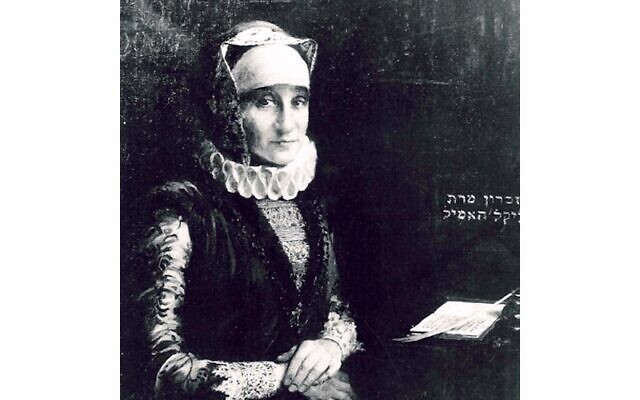Translation of 17th century memoir shows how Jews dealt with plague
Writings of successful Jewish merchant Glikl Hamel give insight into how an infection took hold in Germany with young children forced to quarantine from parents
A new translation of a 350-year old memoir is showing an English-speaking audience how Europe’s Jews dealt with a deadly 17th century plague, including by social distancing.
The memoirs of Glikl Hamel, a successful Jewish merchant, record how the plague took hold in Hamburg and Hanover shortly before the High Holy Days, with young children forced to quarantine from their parents.
In her journal from 1691 to 1719, Hamel recalled how she and her husband Hayyim were ordered to banish their four-year-old daughter, Tsipor, to another town despite her not being ill, after locals reported that they thought she was infected.
Allowed to visit from a distance, Hamel later wrote: “I will let any good father or mother judge for themselves how we felt. My husband, of blessed memory, stood in a corner, weeping and pleading, while I stood in
a corner.”
- Listen to the JN Podcast: Organ donation, Israel’s Covid battle and fighting online hate
Publisher Sylvia Fuks Fried paid tribute to Glikl’s “remarkable skills as a writer”, adding: “It’s why it has such staying power and why we are reading it today.”
The original was written in Old Yiddish, the vernacular language among German-speaking Ashkenazi Jews in the early modern era.
In 2006, Israel Prize winning Yiddish scholar Chava Turniansky translated it into a more modern Hebrew-Yiddish version, and the new book is based on that.
Historian Rachel Greenblatt said: “Glikl provides us with an unparalleled historical source, opening a window on the daily life, anxieties, petty rivalries and stories of folk wisdom occupying the mental world of a woman who bore 14 children.”
Glikl began writing her memoirs of living a Jewish life about two years after the death of her husband in 1689, when she was 44. It was initially a way to console herself through sleepless nights and is embellished by stories and proverbs.

Thank you for helping to make Jewish News the leading source of news and opinion for the UK Jewish community. Today we're asking for your invaluable help to continue putting our community first in everything we do.
For as little as £5 a month you can help sustain the vital work we do in celebrating and standing up for Jewish life in Britain.
Jewish News holds our community together and keeps us connected. Like a synagogue, it’s where people turn to feel part of something bigger. It also proudly shows the rest of Britain the vibrancy and rich culture of modern Jewish life.
You can make a quick and easy one-off or monthly contribution of £5, £10, £20 or any other sum you’re comfortable with.
100% of your donation will help us continue celebrating our community, in all its dynamic diversity...
Engaging
Being a community platform means so much more than producing a newspaper and website. One of our proudest roles is media partnering with our invaluable charities to amplify the outstanding work they do to help us all.
Celebrating
There’s no shortage of oys in the world but Jewish News takes every opportunity to celebrate the joys too, through projects like Night of Heroes, 40 Under 40 and other compelling countdowns that make the community kvell with pride.
Pioneering
In the first collaboration between media outlets from different faiths, Jewish News worked with British Muslim TV and Church Times to produce a list of young activists leading the way on interfaith understanding.
Campaigning
Royal Mail issued a stamp honouring Holocaust hero Sir Nicholas Winton after a Jewish News campaign attracted more than 100,000 backers. Jewish Newsalso produces special editions of the paper highlighting pressing issues including mental health and Holocaust remembrance.
Easy access
In an age when news is readily accessible, Jewish News provides high-quality content free online and offline, removing any financial barriers to connecting people.
Voice of our community to wider society
The Jewish News team regularly appears on TV, radio and on the pages of the national press to comment on stories about the Jewish community. Easy access to the paper on the streets of London also means Jewish News provides an invaluable window into the community for the country at large.
We hope you agree all this is worth preserving.






















